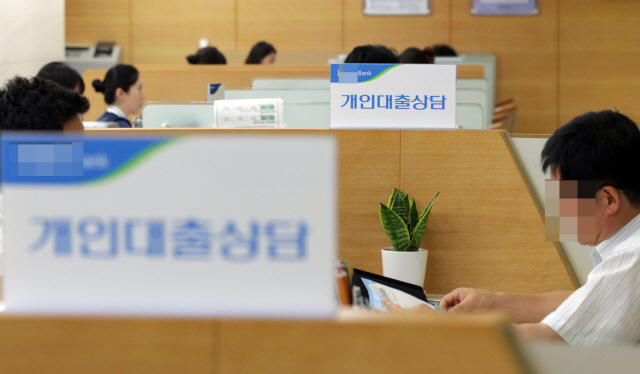
Responding to an explosive surge in Korean lenders’ credit loans extended to borrowers, financial authorities have embarked on working-level talks with banking circles to implement selective loan regulations, officials said Sunday.
The move came as outstanding unsecured loans extended to individuals by the nation’s five major banks -- KB Kookmin, Shinhan, Hana, Woori and NH NongHyup -- surged to 124.3 trillion won ($105 billion) as of end-August, up 4.1 trillion won from July, due partly to ultra-low interest rates as well as side effects from new loan regulations for housing purchases. The credit loan balance further soared to 125.4 trillion won Thursday, gaining more than 1 trillion in just 10 days, data showed.
The Financial Supervisory Service will reportedly restrict credit loans taken out by consumers either to circumvent the government’s tough regulations on mortgage loans designed to curb real estate prices or invest in stocks.
Earlier in June, the Moon administration has tightened rules on the loan-to-value ratio -- the amount of a loan compared to the value of a property -- for the purchase of a home, especially in designated bubble-prone zones.
“We are planning to get credit loans under control except for those used to make ends meet amid the prolonged pandemic,” an FSC official said.
In a preliminary action to set up the new tailored lending rules, the FSS last week held a meeting convened by senior officials at five major lenders here to identify consumers’ loan uses and other factors behind the recent lending spree. On Monday, the financial watchdog is slated to meet vice presidents of top five local banks through video conferencing and exchange views on ways to address the current situation.
Speculation has arisen that the authorities might toughen up rules for the current debt service ratios, or DSR -- the maximum amount of credit loans allowed for individuals compared to their disposable income.
Meanwhile, the authorities are also on high alert over an upward trend in household loans extended by the country’s second-tier lenders that increased by 4.5 trillion won between the June-August period.
The policymaking Financial Services Commission and FSS are analyzing causes behind the surge with a focus on local savings banks, credit card operators and financial companies specialized in loan business.
Considering that borrowers with low credit normally resort to second-tier lending, which carries high interest rates of around 10 percent on average, actual demand would have driven the rapid growth in household borrowing, officials explained.
By Choi Jae-hee (cjh@heraldcorp.com)

















![[KH Explains] Hyundai's full hybrid edge to pay off amid slow transition to pure EVs](http://res.heraldm.com/phpwas/restmb_idxmake.php?idx=652&simg=/content/image/2024/04/18/20240418050645_0.jpg&u=20240418181020)

![[Today’s K-pop] Zico drops snippet of collaboration with Jennie](http://res.heraldm.com/phpwas/restmb_idxmake.php?idx=642&simg=/content/image/2024/04/18/20240418050702_0.jpg&u=)